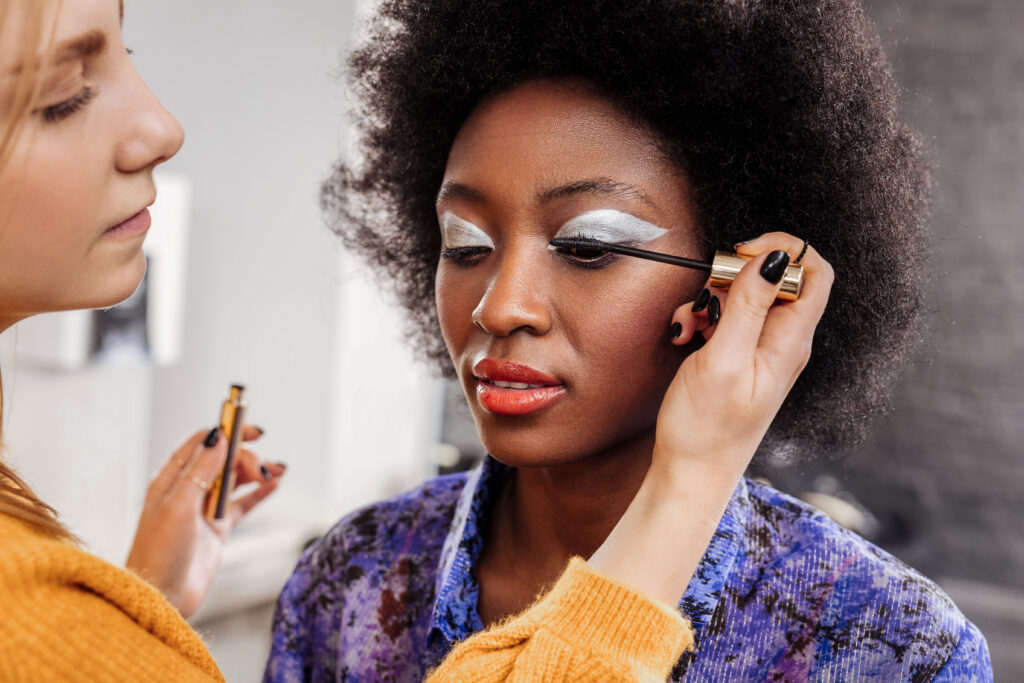
When you work with many different people as an esthetician you will encounter many different types of skin. When dealing with varying skin types, you will need to use different skincare, makeup, and techniques to help your clients achieve the best results. If you have never applied makeup to other skin types, it can be frustrating to see that your application is not working properly. Below are some tips for each skin type and what products are best to use on these clients.
How To Determine Skin Types
Your client may have some idea about what their skin type is and can give you some hints on what works for them and what doesn’t. But other clients may not have a clue what skin type they have.
Your skin type is determined by how much oil your skin produces This amount can change over time, so your skin type may change as you age or when you start new medications, etc. Oily and dry skin are easy to notice, as oily skin will produce more oil than dry skin throughout the day. Combination and sensitive skin may be harder to diagnose.
To conduct a simple test, use a blotting sheet on your cheek with no makeup on. If the sheet picks up noticeable oil, you have oily skin, if the sheet has some oil, you can have either normal or dry skin.
Tips And Products For Oily Skin
The key for oily skin is to start with a double cleanse. This will ensure that you have removed all the pollutants from your skin and any excess oil. You should always use something that’s gentle on the skin and doesn’t strip away too much.
After cleansing, your face will need some moisturizer. Even though you have oily skin, your skin still needs moisture in order to thrive. People with oily skin will want to use a water-based moisturizer or one with a lighter base.
The key to using products with oily skin is to find balance. While you will want to reduce the amount of oil on your skin, you shouldn’t dry it out too much or your glands will get the signal to produce more oil.

When using makeup products on your oily skin, you will want to stipple the products instead of pressing them or pushing them around. Try to avoid cream makeup products and stick to powders. Use a setting powder on high areas of the face like the nose, chin, and forehead to avoid slipping.
Combination Skin Makeup Tips
Having combination skin is also a tricky balance of finding what works for your skincare routine and what doesn’t. People with a combination skin type will still want to cleanse and exfoliate.
Similar to oily skin types, you will want to avoid skincare products that are oil-based. Water-based toners, moisturizers, and primers should be used to prep for makeup.
When it comes time to apply makeup products, use flat makeup brushes or a beauty blender for cream products. Apply translucent powder to your T-zone and use fluffy brushes for powder makeup products.
Skincare Tips And Makeup Products For Dry Skin
When dealing with dry skin, good skincare products, a consistent routine, and hydrating products are all essential. Hydrating moisturizers and primers will be needed if you want your makeup to last all day.
Those with dry skin can start to have patchy areas throughout the day that makes their makeup look less than stellar. The goal is to have hydrated skin with a dewy foundation and utilize cream blush and highlighter. Balms and creams will help your skin look fresh even later in the day.
In order to avoid patchy makeup, apply products with a makeup sponge or beauty blender. Finding the right primer for your skin type will also help prep the skin before applying any products.
Makeup For Sensitive Skin Types
Skin types that are more prone to acne, skin rashes, eczema, or sunburn need to take extra care to protect their skin from free radicals and oil. Sensitive skin types should use a cleanser, a lightweight primer, and sunscreen before applying makeup. Look for skincare products with jojoba oil and niacinamide and throw out expired products as soon as possible.
Sensitive skin can benefit from using a lighter BB cream over a heavy foundation. This will prevent your pores from getting clogged and causing future breakouts.

Another tip to keep your skin from breaking out is to clean all your makeup tools and brushes often. This removes old makeup and bacteria that you continue to put on your face and cause irritation.
When applying makeup to sensitive skin, use your fingers to rub cream products together and warm them. This will help them melt perfectly into the skin. Use a full coverage foundation to cover up dark spots and blend smoothly.
